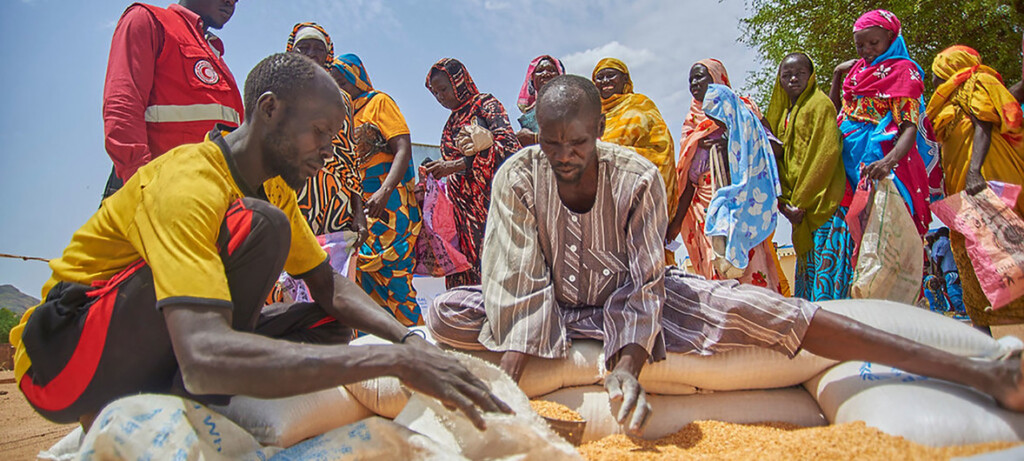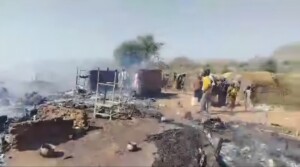‘Four thousand dead, four million fled their homes in Sudan conflict’

WFP food distribution to displaced people in Kadugli, South Kordofan (File photo: OCHA/Sari Omer)
The UN Office for the Coordination of Humanitarian Affairs (OCHA) says more than four million people have been displaced or become refugees by the conflict that erupted on April 15 between the Sudanese Armed Forces and the Rapid Support Forces (RSF) in Sudan. The UN High Commissioner for Human Rights says that the initial toll indicates that 4,000 people have been killed since the war broke out in April, including hundreds of civilians, including 28 humanitarian and health workers and 435 children.
In its latest Humanitarian Update on Tuesday, OCHA said that 71 percent of the roughly 3.3 million displaced people were originally from Khartoum.
Some 13,500 people have been affected by heavy rains and flooding in North Darfur, North and White Nile states.
Humanitarian partners reached some 2.9 million people with life-saving assistance across the country between April and 15 July 2023.
A World Food Programme (WFP) convoy carrying food aid arrived in West Darfur for the first time since the conflict erupted in mid-April. Between August 3 and 5, the convoy was able to deliver food aid to the area. Five lorries carrying 125 tons of food supplies crossed the border from eastern Chad, and delivered one month of food aid to 15,400 people in the villages of Adikonge, Shukri and Garabi.
The situation in the Darfur region, particularly in West and Central Darfur, is dire, where towns and villages have been abandoned following mass displacement of people due to the conflict. Most of those who remained were women and their children, who were extremely vulnerable.
Most of these families eat only one meal a day, share their food with neighbors and sell their belongings to get food costs, the WFP said. Some markets are starting to reopen, with limited quantities of food arriving from Chad.
The Sudanese Doctors Syndicate confirms the exit of 71 major hospitals out of 89 major hospitals in the capital and the states, while the rest of the hospitals are operating at partial capacity. .
Last week, the regional director of the WHO office for the Eastern Mediterranean, Ahmed El Mandhari, predicted that 39 per cent of Sudan’s population will suffer from malnutrition over the next six months due to fighting that has been witnessed since mid-April, restricting people’s access to medicines, medical supplies, electricity and water.
‘An estimated 11 million people in Sudan need urgent health assistance’ – OCHA
An estimated 11 million people in Sudan need urgent health assistance, including about four million acutely malnourished pregnant and lactating children and women, and more than 100,000 children under the age of five suffering from severe acute malnutrition with medical complications in need of specialized care.
The World Health Organisation (WHO) confirmed 53 attacks on healthcare, including 11 deaths and 38 injuries between April 15 and August 13.
Up to 13,500 people have been affected by heavy rains and flooding in North Darfur, Northern State, and White Nile state.
About seven million children are out of school in Sudan.
OCHA confirmed it was able to deliver 673 trucks in June and July carrying nearly 31,000 metric tons of relief items to those in need and displaced people in need.
The office indicated the delivery of relief items to Khartoum (2,892 metric tons), North Darfur (550 metric tons), North Kordofan (180 metric tons), South Kordofan (810 metric tons), West Kordofan (420 metric tons) and White Nile (10,897 metric tons). This included 30,300 metric tons of food, 160 metric tons of emergency shelter and non-food items, and 170 metric tons of health supplies and nutrition.
In July, OCHA gained access to 13 new sites in three states for the first time since April 15, including Abu Jubeiha and El Abbasiya in South Kordofan, El Rahad and El Obeid in North Kordofan, En Nahud and El Fula in West Kordofan, and seven localities in East Darfur including Ed Daein, Abu Jabra, Abu Karnaka, Adila, Asalaya, Bahr El Arab, El Firdaws, Yasin and El Sheiria.
‘The initial toll indicates that 4,000 people have been killed since the war broke out in April, including hundreds of civilians, 28 humanitarian and health workers and 435 children’ – Volker Türk, UN High Commissioner for Human Rights
The UN High Commissioner for Human Rights, Volker Türk, said the initial toll indicates that 4,000 people have been killed since the war broke out in April, including hundreds of civilians, 28 humanitarian and health workers and 435 children.
Türk said in a statement on Tuesday that they have reasonable grounds to believe that the military and RSF have committed serious violations of international law during the ongoing conflict, which is entering its fifth month, including violations of international humanitarian law and international human rights law, and that perpetrators must be held accountable.
He called on the parties to the conflict to immediately cease hostilities, resume political talks, comply with their legal obligations under international humanitarian law, in particular the principles of distinction, proportionality and precaution during military operations, and allow humanitarian access,” the UN official said.











 and then
and then